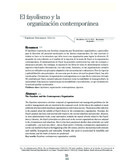| dc.rights.license | http://creativecommons.org/licenses/by-nc-sa/3.0/ve/ | |
| dc.contributor.author | Espinoza Sotomayor, Roberto | |
| dc.date.accessioned | 2009-10-28T20:18:00Z | |
| dc.date.available | 2009-10-28T20:18:00Z | |
| dc.date.issued | 2009-10-28T20:18:00Z | |
| dc.identifier.issn | 1317-8822 | es_VE |
| dc.identifier.uri | http://www.saber.ula.ve/handle/123456789/29628 | |
| dc.description.abstract | El fayolismo representa una doctrina compuesta por lineamientos organizativos y gerenciales para la dirección del personal involucrado en las labores empresariales. En esta corriente el énfasis se hace en la estructura que debe tener una organización para lograr la eficiencia. El propósito de esta reflexión es el análisis de la vigencia de la teoría de Fayol en la organización contemporánea. El planteamiento de Fayol ha generado controversia hoy ante los enfoques y situaciones actuales. Sin embargo, la mayoría de los libros de texto de administración incluyen aspectos relacionados directamente con esta teoría. Asimismo, en las organizaciones actuales suelen ser utilizados sus principios adaptados a las circunstancias o situaciones. Pero la vigencia y aplicabilidad de estos principios –de unos más que de otros– tal cual los planteó Fayol, han sido cuestionadas. Ciertamente, la organización contemporánea no es aquella de comienzos del siglo XX estudiada por Fayol, caracterizada por elementos como la estabilidad, la homogeneidad y la racionalidad. Esta época se caracteriza por la inestabilidad e incertidumbre, en que los límites de lo racional quedan cuestionados. | es_VE |
| dc.language.iso | es | es_VE |
| dc.rights | info:eu-repo/semantics/openAccess | |
| dc.subject | Fayolismo | es_VE |
| dc.subject | Organización contemporánea | es_VE |
| dc.subject | Vigencia | es_VE |
| dc.title | El fayolismo y la organización contemporánea | es_VE |
| dc.title.alternative | The Fayolism and the Contemporary Organization | es_VE |
| dc.type | info:eu-repo/semantics/article | |
| dc.description.abstract1 | The Fayolism represents a doctrine composed of organizational and managerial guidelines for the workers’ managements who are involved in the company’s work. In this theory the emphasis is made within the structure which must have organization in order to have success. The purpose of this reflection is the analysis about the validity of Fayol’s theory in the contemporary organization. Nowdays, the Fayol’s analysis has been controversial with respect to the current situations and aproches. However, in most administrative books, some information includes the aspects directly related to the Fayol’s theory. Likewise, the Fayol’s principles are often used in the current organizations that are adapted to the circumstances and situations. But it is has been questioned whether these principles are valid or applicable – one more tan others – just as Fayol said it. Certainly, contemporary organization is not the one studied by Fayol at the bigginning of the XX century, which is characterized with elements such stability, homogeneity and rationality. Actually, this epoch is caracterized by instability and uncertainty, and the limits of reason are questioned. | es_VE |
| dc.description.colacion | 53-62 | es_VE |
| dc.description.email | roberesso1@hotmail.com | es_VE |
| dc.subject.centroinvestigacion | Centro de Investigaciones y Desarrollo Empresarial (CIDE) | es_VE |
| dc.subject.facultad | Facultad de Ciencias Económicas y Sociales | es_VE |
| dc.subject.keywords | Fayolism | es_VE |
| dc.subject.keywords | Contemporary organization | es_VE |
| dc.subject.keywords | Validity | es_VE |
| dc.subject.publicacionelectronica | Revista Visión Gerencial | es_VE |
| dc.subject.seccion | Revista Visión Gerencial: Artículos | es_VE |
| dc.subject.thematiccategory | Ciencias Económicas y Sociales | es_VE |
| dc.subject.tipo | Revistas | es_VE |
| dc.type.media | Texto | es_VE |



